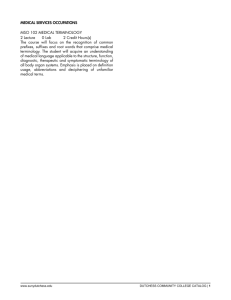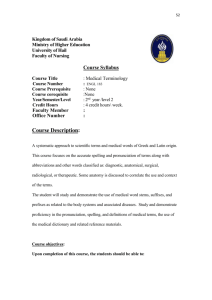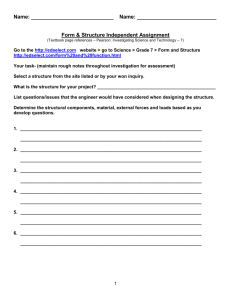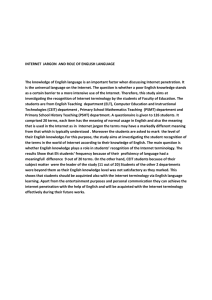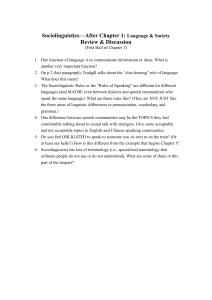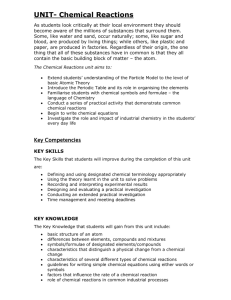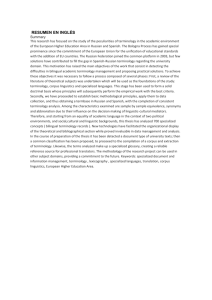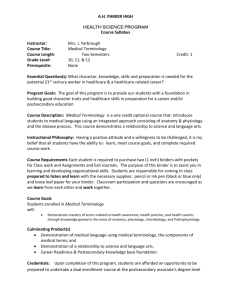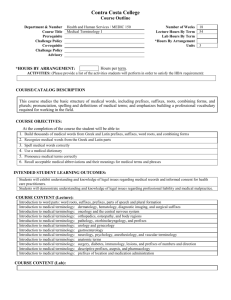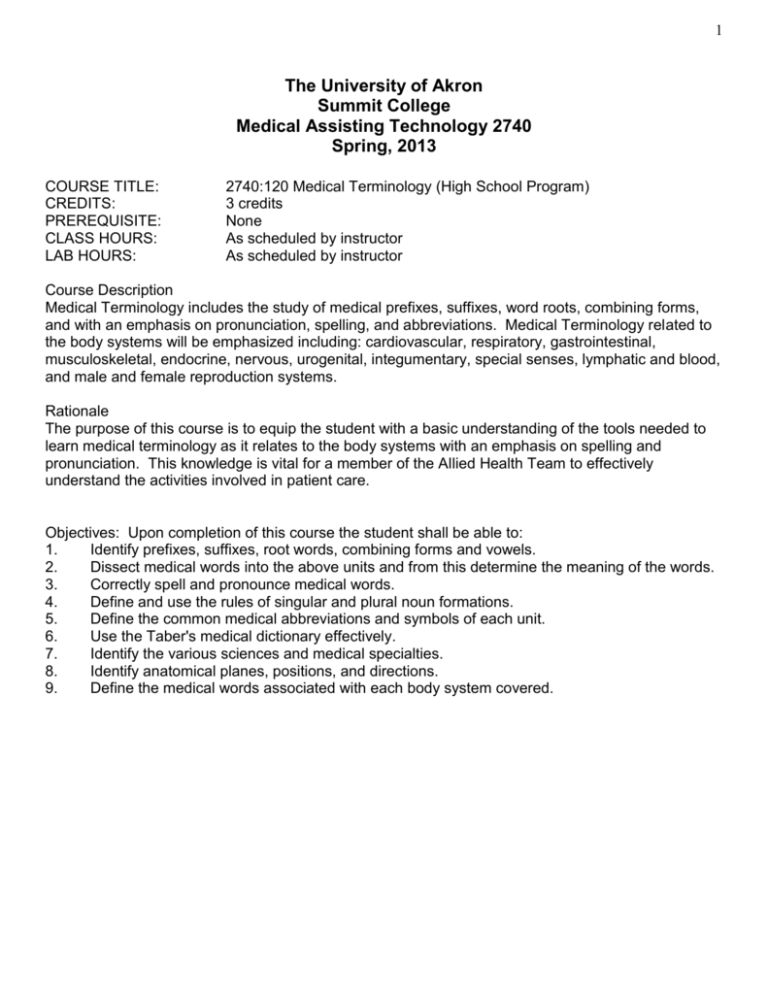
1
The University of Akron
Summit College
Medical Assisting Technology 2740
Spring, 2013
COURSE TITLE:
CREDITS:
PREREQUISITE:
CLASS HOURS:
LAB HOURS:
2740:120 Medical Terminology (High School Program)
3 credits
None
As scheduled by instructor
As scheduled by instructor
Course Description
Medical Terminology includes the study of medical prefixes, suffixes, word roots, combining forms,
and with an emphasis on pronunciation, spelling, and abbreviations. Medical Terminology related to
the body systems will be emphasized including: cardiovascular, respiratory, gastrointestinal,
musculoskeletal, endocrine, nervous, urogenital, integumentary, special senses, lymphatic and blood,
and male and female reproduction systems.
Rationale
The purpose of this course is to equip the student with a basic understanding of the tools needed to
learn medical terminology as it relates to the body systems with an emphasis on spelling and
pronunciation. This knowledge is vital for a member of the Allied Health Team to effectively
understand the activities involved in patient care.
Objectives: Upon completion of this course the student shall be able to:
1.
Identify prefixes, suffixes, root words, combining forms and vowels.
2.
Dissect medical words into the above units and from this determine the meaning of the words.
3.
Correctly spell and pronounce medical words.
4.
Define and use the rules of singular and plural noun formations.
5.
Define the common medical abbreviations and symbols of each unit.
6.
Use the Taber's medical dictionary effectively.
7.
Identify the various sciences and medical specialties.
8.
Identify anatomical planes, positions, and directions.
9.
Define the medical words associated with each body system covered.
2
Textbooks
1.
Gylys, Barbara and Wedding, Mary Ellen, Medical Terminology, 6th Edition, F.A. Davis Co.,
2009.
2.
Taber's Cyclopedic Medical Dictionary, 21th Edition, F.A. Davis Co., 2009.
3
Evaluation
Comprehensive
Final Exam
100 points
100%
Grading Scale
B+
=
89-86
A
=
100-94
A-
=
93-90
B
=
85-83
B-
=
82-80
F
=
BELOW 80
BIBLIOGRAPHY
1.
Chabner, Davi-Ellen, The Language of Medicine, 8th Edition, Person Prentice Hall, 2007.
2.
Ehrlich, A & Schroeder, Medical Terminology for Health Professions, 6th Edition, Delmar, 2009.
3.
Jones, B.D., Comprehensive Medical Terminology, 3rd Edition, Thomson Learning, 2008.
4
Rice, Jane, Medical Terminology with Human Anatomy, 6th Edition, Pearson/Prentice Hall,
2008.
5.
Thierer, N et al, Medical Terminology:Language for Health Care, 3rd Edition. McGraw Hill,
2010.
6.
Turley, Susan, Medical Language:Immerse Yourself, 2nd Edition, Pearson, 2011.
7.
Wingerd, Bruce, Unlocking Medical Terminology, 2nd Edition. Pearson, 2010.
COMPUTER PROGRAM
A user-friendly color computer program is available for your use with your textbook to use on your
home computer.
TEST
Test will consist of multiple choice, matching, and true or false questions. Any student cheating on a
test, etc. will receive an F for the course and may be subject to disciplinary action as determined by
school administration. The final exam is comprehensive.
4
Medical Terminology Schedule
UNITS
Unit 1
Topic
Chapter
Reading
___________________________________________________________________________
Basic Elements
of a Medical Word
Suffixs
Prefixes
Chapter 1
Chapter 2
Chapter 3
Page 1-11
Page 11-28
Page 29-37
Unit 2
Body Structure
Integumentary
Digestive System
Special Senses
Chapter 4
Chapter 5
Chapter 6
Chapter 15
Page 39-74
Page 75-105
Page 107-149
Page 457-492
Unit 3
Cardiac
Chapter 8
Respiratory
Chapter 7
Blood, Lymph & Immune System Chapter 9
Page 187-223
Page 151-186
Page 225-262
Unit 4
Musculoskeletal
Genitourinary
Female Reproduction
Chapter 10
Chapter 11
Chapter 12
Page 263-305
Page 307-343
Page 345-385
Unit 5
Endo
Nervous
Chapter 13
Chapter 14
Page 387-418
Page 419-455
Final Comprehensive Exam Week of May 6-12, 2013.
THIS COURSE IS SUBJECT TO CHANGE AT DISCRETION OF PROFESSOR

